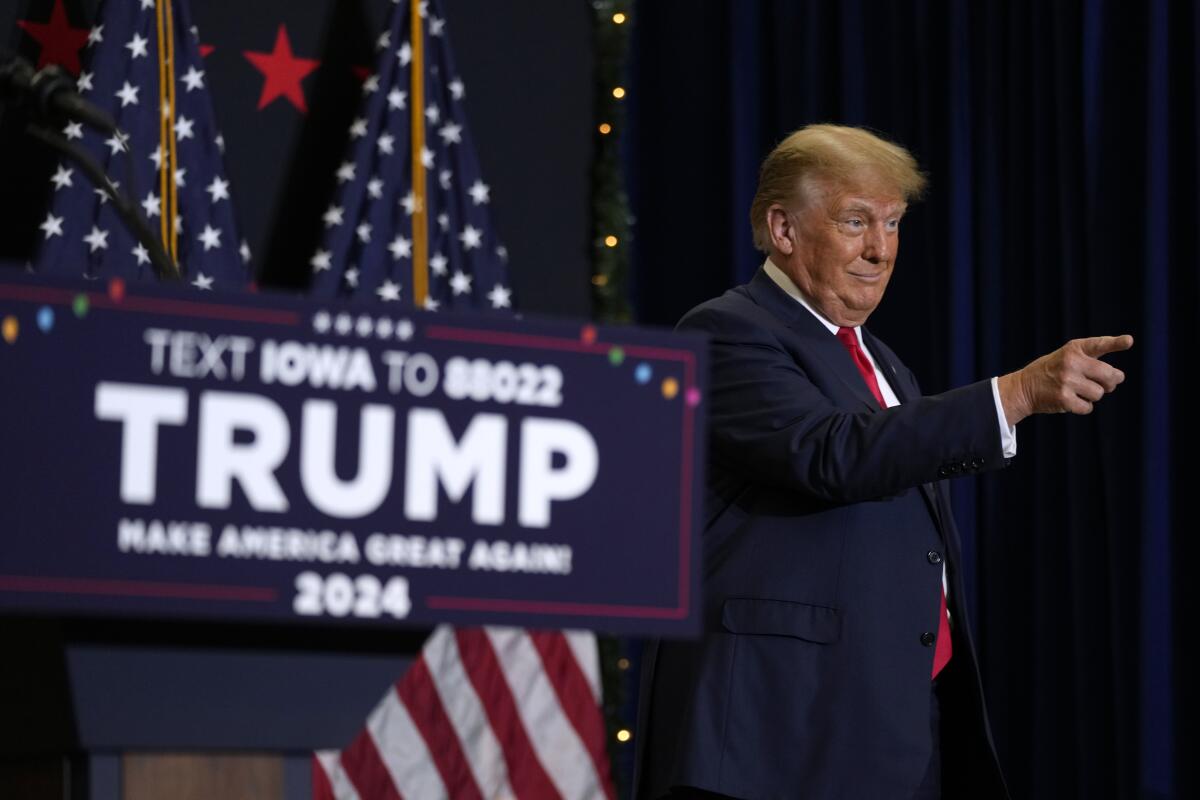Maine bars Trump from ballot as U.S. Supreme Court weighs state authority to block former president

PORTLAND, Maine — Maine’s Democratic secretary of state on Thursday removed former President Trump from the state’s presidential primary ballot under the Constitution’s insurrection clause, becoming the first election official to take action unilaterally in a decision that has potential electoral college consequences.
Although Maine has only four electoral votes, it’s one of two states to split them. Trump won one of Maine’s electors in 2020, so having him off the ballot there should he emerge as the Republican general election candidate could have outsize implications in a race that is expected to be narrowly decided.
The decision by Secretary of State Shenna Bellows follows a December ruling by the Colorado Supreme Court that booted Trump from the ballot there under Section 3 of the 14th Amendment. Colorado is a Democratic-leaning state that is not expected to be competitive for Republicans in November.
Bellows found that Trump could no longer run for his prior job because his role in the Jan. 6, 2021, attack on the U.S. Capitol violated Section 3, which bans from office those who “engaged in insurrection.” Bellows made the ruling after some state residents, including a bipartisan group of former lawmakers, challenged Trump’s position on the ballot.
In central Gaza, Israeli warplanes and artillery pounded the built-up Bureij and Nuseirat refugee camps, leveling buildings, residents said.
“I do not reach this conclusion lightly,” Bellows wrote in her 34-page decision. “I am mindful that no Secretary of State has ever deprived a presidential candidate of ballot access based on Section 3 of the 14th Amendment. I am also mindful, however, that no presidential candidate has ever before engaged in insurrection.”
The Trump campaign immediately slammed the ruling. “We are witnessing, in real time, the attempted theft of an election and the disenfranchisement of the American voter,” campaign spokesman Steven Cheung said in a statement.
Thursday’s ruling demonstrates the need for the nation’s highest court, which has never ruled on Section 3, to clarify what states can do.
“It is clear that these decisions are going to keep popping up, and inconsistent decisions reached (like the many states keeping Trump on the ballot over challenges) until there is final and decisive guidance from the U.S. Supreme Court,” Rick Hasen, a law professor at UCLA, wrote in response to the Maine decision. “It seems a certainty that SCOTUS will have to address the merits sooner or later.”
Her decision came one day after Trump’s lawyers asked her to disqualify herself over tweets that they said showed bias. She called the U.S. Capitol attack an “insurrection” and bemoaned that Trump wasn’t convicted by the U.S. Senate after being impeached by the U.S. House.
Bellows won’t have the final word on Trump’s political career. Her decision can be appealed to Maine’s courts. The U.S. Supreme Court is expected to make a final decision on whether Trump can still run for president early next year.
Activists have asked state election officials across the country to remove Trump from their states’ primary ballots under Section 3. Until Bellows’ ruling, all of them rejected the request, often saying they were waiting for courts to give direction on how to interpret the clause, which has been used only a handful of times since the years following the Civil War.
Maine law mandated that Bellows hold a public hearing over the issue, which she did in December. A lawyer and former executive director of the Maine chapter of the American Civil Liberties Union, Bellows allowed each side to submit additional arguments after the Colorado Supreme Court’s historic Dec. 19 decision that Section 3 barred Trump from the ballot.
Trump’s campaign has said it will appeal that court’s 4-3 ruling to the U.S. Supreme Court, which has never ruled on Section 3. Whatever the high court decides will apply to every state, including Maine.
The Maine decision shows the potential perils to Trump if the issue is decided on a state-by-state basis. He lost Colorado by 13 percentage points in 2020 and does not need it to win the presidency. But Maine divides its electoral votes by congressional districts, and Trump has twice won the state’s 2nd Congressional District.
If he’s not on the ballot there, he would start his 2024 campaign down one electoral college vote.
The secretary of state’s office said it’s not aware of the office previously striking a presidential candidate from the ballot, but other candidates for lower offices have been removed that way.
More to Read
Sign up for Essential California
The most important California stories and recommendations in your inbox every morning.
You may occasionally receive promotional content from the Los Angeles Times.











